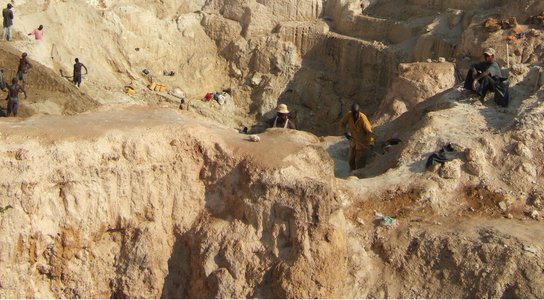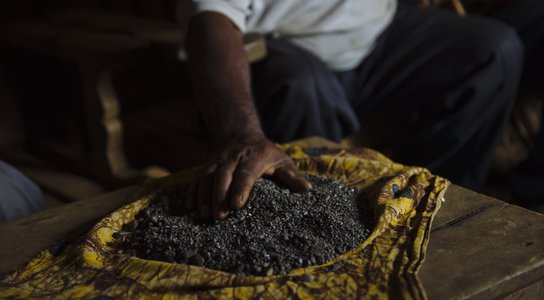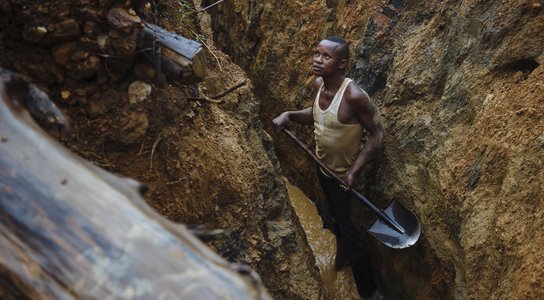Global Witness report says supply chain checks essential to stop conflict funding
Global Witness welcomes new Chinese Guidelines for overseas mining and mineral trading firms which promises benefits for both participating firms and local people. The Guidelines, launched in Beijing today at an event co-hosted by Global Witness, include the strongest endorsement by a Chinese Chamber of Commerce of international standards to prevent the financing of conflict and corruption linked to the mining sector.
“The new Guidelines are a progressive and practical set of measures for companies. They also offer real opportunities for communities impacted by mining and mineral trading operations,” said Lizzie Parsons, Senior Advisor for Global Witness. “Rigorous implementation by forward-thinking companies is now vital.”
The Guidelines for Social Responsibility in Outbound Mining Operations* have been launched by the Chinese Chamber of Commerce of Metals, Minerals and Chemicals Imports and Exports, CCCMC, which is supervised by the Ministry of Commerce. CCCMC drafted the Guidelines in association with the Chinese Ministry of Commerce and the German development agency GIZ, following a year-long drafting process and public consultation. The Guidelines comprise standards on labour, environmental protection, supply chain due diligence, community engagement and human rights.
Global Witness is marking the Guidelines launch with the publication of a new briefing paper, Tackling conflict minerals – How a new Chinese initiative can address Chinese companies’ risks. The briefing paper highlights a particular component of the CCCMC Guidelines – the need for Chinese companies to carry out rigorous supply chain checks, known as due diligence. These checks help companies avoid funding brutal armed groups when sourcing minerals from conflict-affected and high-risk locations. The briefing uses first hand research from the Democratic Republic of Congo in central Africa to show reputational and legal risks facing Chinese and other companies when buying minerals originating from overseas mining areas. It also documents the host country, international and industry schemes that may impact on these companies’ operations.
In addition to supply chain checks, the CCCMC Guidelines also call on implementing companies to disclose payments made to host governments in line with global transparency standards, highlighting in particular the Extractive Industry Transparency Initiative (EITI) and multiple stock exchange listing rules. Forty eight countries are members of EITI, an anti-corruption scheme that requires oil, gas and mining companies to publish payments they make to governments on a project-by-project basis, and for governments to publish what revenues they receive.
“CCCMC, GIZ and the Chinese Ministry of Commerce are to be congratulated for their ambitious initiative,” said Parsons. “It’s now time for member companies to take up the challenge of bringing the Guidelines to life and show themselves to be responsible global corporate citizens.”
* CCCMC has revised the Guidelines in 2017, Please click the button below to download it.
/ ENDS
Notes to editor:
- Global Witness is supporting the launch of the CCCMC Guidelines by co-hosting an event at the Exploration Exchange China conference. http://www.exploration-exchange.cn/
- Global Witness participated in the CCCMC Guidelines consultation, submitting recommendations in January and March 2014 and is a Technical Expert to the Guidelines initiative.
- CCCMC is a Chamber of Commerce supervised by the Chinese Ministry of Commerce. It is comprised of nearly 6,000 members across state and private sectors. Its website is http://en.cccmc.org.cn/index.htm
- Further information about EITI can be found at www.eiti.org.
- The UN Security Council (of which China is a permanent member) and the Organisation for Economic Cooperation and Development have published due diligence guidance for companies using minerals source from high risk environments. Chinese mineral investments are particularly at risk given that a significant proportion are concentrated in conflict-afflicted or post-conflict countries including Myanmar, Afghanistan and the Democratic Republic of Congo. The complete OECD due diligence guidance can be accessed here: http://dx.doi.org/10.1787/9789264185050-en. The UN Guidelines, which apply specifically to Central Africa, can be found athttp://www.un.org/News/dh/infocus/drc/Consolidated_guidelines.pdf.
- Global Witness has documented many case studies of conflict and corruption risks for companies investing abroad, including the following:
- “Putting principles into practice”, a briefing paper on high-level military involvement in the gold trade in eastern Democratic Republic of Congo http://www.globalwitness.org/library/new-investigation-global-witness-reveals-high-level-military-involvement-eastern-congos-gold
- “China and Congo: Friends in Need”, a report on Chinese investments in the Democratic Republic of Congohttp://www.globalwitness.org/sites/default/files/library/friends_in_need_en_lr.pdf
- “Copper Bottomed? Bolstering the Aynak contract: Afghanistan’s first major mining deal”, a report on the Aynak copper mine in Afghanistan http://www.globalwitness.org/library/copper-bottomed-bolstering-aynak-contract-afghanistan%E2%80%99s-first-major-mining-deal
- “Risky Business: Kazakhstan, Kazakhmys plc and the London Stock Exchange” a report on corruption risks associated with a Kazakh company http://www.globalwitness.org/library/kazakh-company-ftse-100-risk-investors-says-global-witness
- “Financing a parallel government?”, a report on questionable business links of Zimbabwe’s Central Intelligence Organisation http://www.globalwitness.org/library/financing-parallel-government-Zimbabwe
You might also like
-
Briefing Conflict Minerals in Eastern Congo
Resource-fuelled conflict has contributed to instability in Congo’s east for over two decades.
-
Mining for our Minerals
Meet the men and women who work in the Congolese mines to supply international companies’ insatiable demand for tin, tungsten, tantalum and gold.
-
Press release Global Witness welcomes progressive new Chinese mineral supply chain guidelines
New Chinese industry guidelines for carrying out mineral supply chain checks can play a vital part in efforts to address resource-linked conflict and human rights abuses around the world, says Global Witness.